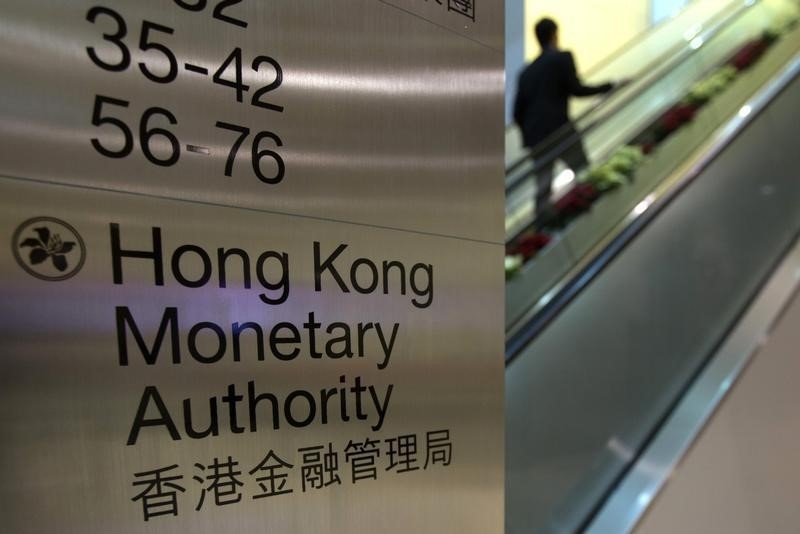(Bloomberg) -- The economy is crashing like never before, yet Hong Kong’s interest rates are expected to stay relatively elevated. That’s bad news for pretty much everyone apart from those betting on prolonged strength in the city’s currency.
Liquidity tightness in Hong Kong, partly caused by central bank moves to drain cash from the interbank market several years ago, contrasts with U.S. moves to slash borrowing costs. The resulting gap in interest rates -- near the widest since 1999 for the one-month tenor -- makes selling the greenback to buy the Hong Kong dollar a profitable trade due to the city’s currency peg.
While the Hong Kong Monetary Authority is now adding funds when it intervenes to defend the peg at the strong end, the amounts are insufficient to do much to shift the gap. The spread widened last month even as the HKMA injected $2.7 billion.
“For the interest-rate gap to narrow significantly enough, Hong Kong needs to see strong capital inflows from overseas funds,” said Carie Li, an economist at OCBC Wing Hang Bank Ltd. in Hong Kong. “But investor confidence won’t return until the pandemic is over, and that won’t happen in the near term.”
The city’s economy shrank 8.9% in the first quarter from a year earlier, a government report showed Monday. That’s the worst drop in data going back to 1974, according to the Census and Statistics Department Hong Kong. It marks the third straight quarterly contraction for the city, which experienced widespread disruptions as anti-government protests broke out in the second half of 2019.
Elevated funding costs, which underpin things like mortgages and corporate lending, may make companies and households less willing to borrow, according to Eddie Cheung, an emerging-market strategist at Credit Agricole (OTC:CRARY) SA. The HKMA last lowered its benchmark rate in March by 64 basis points, less than the 1 percentage-point cut deployed by the U.S. Federal Reserve.
The distortions are a side effect of maintaining the currency peg. While the city has benefited from the stability the peg provides, the trade off is a loss of control over monetary policy. In the years after the global financial crisis, while Hong Kong’s economy was booming, ultra-low borrowing costs helped fuel a property bubble. Now, it faces the reverse, despite falling U.S. rates.
The one-month borrowing cost in the first quarter of 2011 -- when the economy grew at a blistering 7.6% -- never rose above 0.2%. It currently stands at 1.1%, versus about 0.3% for the U.S. equivalent.
Hong Kong dollar bears like Crescat Capital’s Kevin Smith say the currency peg is unsustainable due to the city’s diminishing role as an international banking haven. He’s holding on to his short-Hong Kong dollar positions despite the recent strength, betting it will depreciate all the way to the weak end of the band.
Questions have been raised about the durability of the peg since it was created in 1983 to stabilize confidence and outflows during uncertainty over the then-British colony’s future. The U.K. and Chinese governments agreed on the city’s return to mainland control the following year.
George Soros tried and failed to bet against the peg in 1998, while Bill Ackman’s wager on a dramatic strengthening in 2011 also proved fruitless.
The HKMA’s shrinking aggregate balance is partly responsible for the city’s tight liquidity conditions. The gauge of interbank cash supply is down 70% over the past two years, near the lowest since the aftermath of the global financial crisis. Most of that money was drained by the de-facto central bank to defend the currency peg as the Hong Kong dollar was repeatedly pushed to 7.85 per greenback, the weakest it can technically trade.
The HKMA may have to boost the aggregate balance to as high as HK$150 billion ($19 billion) in the second quarter for rates to shift lower, analysts have said. The balance is currently at HK$84.7 billion, and will increase to HK$94.7 billion after May 6.
The city will ensure its money and foreign-exchange markets operate smoothly, HKMA chief Eddie Yue said a statement last month.
Another sign of tight liquidity can be found in lenders’ balance sheets. The city’s banks have far less idle cash on hand after the amount of funds on loan soared to the highest since 2002 relative to deposits. The latest data shows their loan-to-deposit ratio was at 90% in February, compared to just under 70% in 2009. Local currency savings increased just 2.5% last year, the least in more than a decade.
To be sure, borrowing costs have fallen, just not as fast as those in the U.S. The one-month interbank rate was as high as 2.7% at the end of last year.
But for now, it looks like those betting on currency strength have time on their side, something that can’t be said for the city’s businesses facing a ravaged economy.
©2020 Bloomberg L.P
